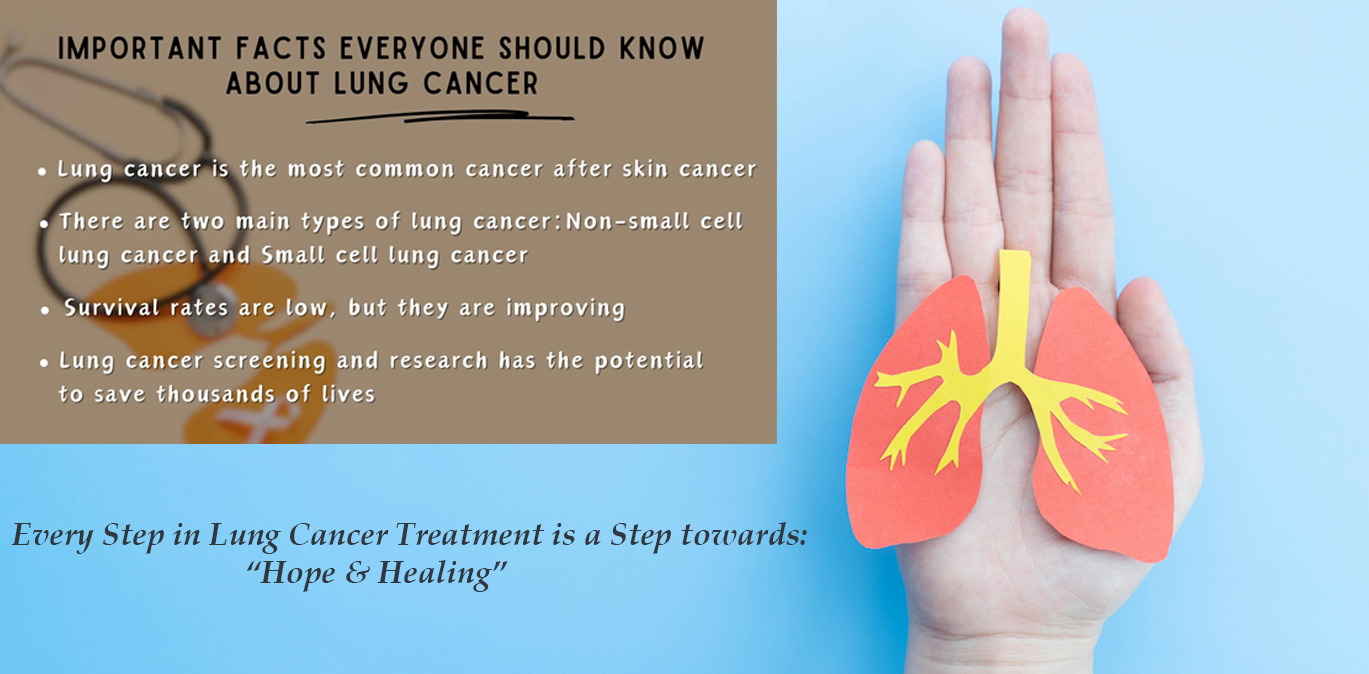Lung cancer is a significant health concern, being one of the leading causes of cancer-related deaths worldwide. The treatment landscape for lung cancer is diverse and tailored to the individual patient, based on factors such as cancer type, stage, and overall health.
“From Smoke to Hope: How Quitting Today Lowers Lung Cancer Risk Tomorrow”
Types of Lung Cancer
Lung cancer is primarily categorized into two main types:
- Non-Small Cell Lung Cancer (NSCLC): This is the most common type, accounting for about 80-85% of all lung cancer cases. It includes subtypes such as adenocarcinoma, squamous cell carcinoma, and large cell carcinoma.
- Small Cell Lung Cancer (SCLC): This type is less common but tends to grow and spread more quickly than NSCLC.
Treatment Options
- Surgery
Surgery is often the first line of treatment for early-stage lung cancer, particularly for NSCLC. The goal is to remove the tumor and surrounding lung tissue. Types of surgical procedures include:
- Lobectomy: Removal of an entire lobe of the lung.
- Pneumonectomy: Removal of an entire lung.
- Wedge Resection: Removal of a small section of the lung.
- Segmentectomy: Removal of a larger section than a wedge but smaller than a lobe.
Surgery may not be an option for SCLC or advanced NSCLC due to the cancer’s spread.
- Radiation Therapy
Radiation therapy uses high-energy rays to kill cancer cells. It can be used as a primary treatment, before surgery to shrink tumors, or after surgery to eliminate remaining cancer cells. Techniques include:
- External Beam Radiation: The most common form, which targets the tumor from outside the body.
- Stereotactic Body Radiation Therapy (SBRT): A more precise form of radiation that delivers high doses over fewer sessions, suitable for small, localized tumors.
- Chemotherapy
Chemotherapy involves using drugs to kill cancer cells and is often administered intravenously. It can be used:
- Before Surgery (Neoadjuvant Therapy): To shrink tumors.
- After Surgery (Adjuvant Therapy): To eliminate residual cancer cells.
- As Primary Treatment: For advanced NSCLC or SCLC.
Chemotherapy can have significant side effects, including nausea, fatigue, and increased risk of infection.
- Targeted Therapy
Targeted therapies are designed to attack specific characteristics of cancer cells, such as mutations that help them grow. This approach is particularly effective for certain subtypes of NSCLC that harbor specific genetic mutations (e.g., EGFR mutations). Common targeted therapies include:
- EGFR Inhibitors: Such as erlotinib and gefitinib. EGFR (Epidermal Growth Factor Receptor): Mutations in this receptor can lead to uncontrolled cell growth. Drugs like osimertinib (Tagrisso) effectively inhibit this pathway.
- ALK Inhibitors: ALK-positive tumors can be treated with inhibitors such as alectinib and crizotinib.
- Immunotherapy
Immunotherapy helps the body’s immune system recognize and attack cancer cells. This treatment has shown promise, especially for advanced NSCLC. Common immunotherapy agents include:
- Checkpoint Inhibitors: Such as pembrolizumab and nivolumab, which help the immune system recognize cancer cells.
- Clinical Trials
Participating in clinical trials may provide access to new and innovative treatments that are not yet widely available. These trials can be an option for patients at any stage of lung cancer treatment.
- Palliative Care
For advanced lung cancer, palliative care focuses on relieving symptoms and improving quality of life. This may involve pain management, respiratory support, and other supportive therapies.
How effective are antibody drug conjugates in treating advanced NSCLC
Antibody-drug conjugates (ADCs) have emerged as a promising therapeutic option for treating advanced non-small cell lung cancer (NSCLC), particularly in patients who have relapsed or are refractory to standard treatments. These innovative agents combine the specificity of monoclonal antibodies with the potency of cytotoxic drugs, allowing for targeted delivery to cancer cells while minimizing damage to healthy tissues.
Efficacy of Antibody-Drug Conjugates in Advanced NSCLC
Clinical Outcomes
Recent clinical trials have demonstrated encouraging results for ADCs in advanced NSCLC. For instance:
Trastuzumab Deruxtecan (T-DXd): This ADC targets HER2 and has shown significant efficacy in patients with HER2-mutated NSCLC. In pivotal trials, T-DXd achieved an overall response rate (ORR) of approximately 44% and a median progression-free survival (PFS) of 16.8 months in heavily pre-treated populations.
Sacituzumab Govitecan: This ADC targets TROP2 and has been tested in combination with pembrolizumab (Keytruda). In the EVOKE-02 trial, the combination yielded ORRs of 69% in patients with high PD-L1 expression and 44% in those with lower expression, showcasing its potential across different tumor profiles.


3 Comments
Lorem ipsum dolor sit amet, consectetur adipiscing elit, sed do eiusmod tempor incididunt ut labore et dolore magna aliqua. Quis ipsum suspendisse ultrices gravida. Risus commodo viverra maecenas accumsan lacus vel facilisis.
Cras maximus ultricies volutpat. Praesent ut enim non enim vulputate fringilla.
Cras maximus ultricies volutpat. Praesent ut enim non enim vulputate fringilla.